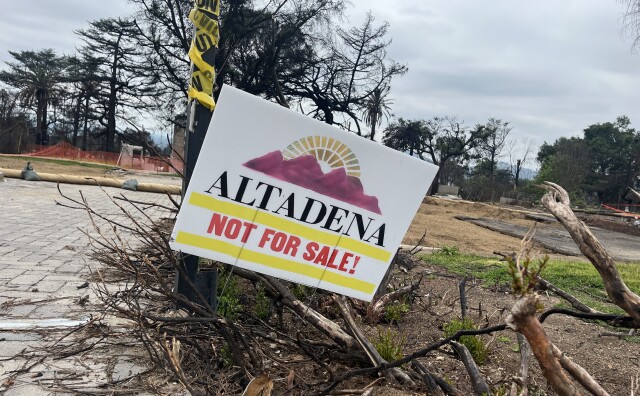Congress has cut federal funding for public media — a $3.4 million loss for LAist. We count on readers like you to protect our nonprofit newsroom. Become a monthly member and sustain local journalism.
How has private school security changed in Tennessee, a year after Covenant shooting?
LEILA FADEL, HOST:
Today marks one year since an assailant shot and killed six people at a private Christian school in Nashville, Tenn. The Covenant School shooting thrusts renewed focus on school security, especially at private schools, which have less regulation. Alexis Marshall of member station WPLN reports on what has changed in the year since.
ALEXIS MARSHALL, BYLINE: Sixteen-year-old Addie Brue was a student at St. Cecilia Academy, a Catholic school in Nashville, when the Covenant shooting happened. A few days later, she attended a vigil for the victims.
ADDIE BRUE: I just feel so upset, especially for, like, the parents who lost their child.
MARSHALL: The shooting also stirred fears about her own safety.
ADDIE: I just - I don't want to be - feel scared going to school anymore and having to think about what do I do if there's a shooter that wants - that's, like, going to come in and where do I go? And I'm tired of living in fear.
MARSHALL: In the weeks that followed the shooting, protesters showed up at the state capitol in the thousands, many of them students and parents, demanding gun reform. The Republican-controlled legislature ignored their demands, but lawmakers did approve more than $200 million to support school security. Most of that went toward the public school system, which has many state-mandated safety requirements. Fourteen million was dedicated to private schools. Shannon Gordon of Tennessee's Department of Education lays out what they used it for.
SHANNON GORDON: Things like perimeter control, signage, access control.
MARSHALL: Think fencing around schools, a single point of entry and a system to buzz to get into the front office. Schools have also used the public funds to invest in window protection, visitor background check systems and increased surveillance, to name a few. Still, Gordon recognizes all of these measures have limitations.
GORDON: There isn't a product out there that is going to stop all bullets from coming in. Those products just don't exist.
MARSHALL: What these measures can do is buy time for law enforcement to arrive, she says. Brian Yarbro is in charge of school safety at Tennessee's Department of Education. He says he hears from a lot of private school leaders who are grateful to have these public dollars.
BRIAN YARBRO: All school administrators have had the same goal, and that's to make sure that we do everything possible to keep our kids safe and our staff safe.
MARSHALL: He says a crucial part of mitigating risk is changing how we think about school shootings.
YARBRO: And we've got to get out of the mindset of, oh, it can't happen here because it can.
MARSHALL: Despite the millions of dollars Tennessee has spent hardening schools to intruders, critics say these investments don't address some of the root causes of school shootings, like Tennessee's easy gun access, which allowed the Covenant School shooter to buy seven guns, including an AR-15-style weapon. It's something Addie Brue identified at the vigil last year in the immediate aftermath of the shooting.
ADDIE: I really want there to be better gun control. Like, I feel like that's a must.
MARSHALL: One year after Covenant, calls for gun reform continue in Tennessee. To date, lawmakers have not passed any new limits on what kinds of guns can be purchased or who can carry them.
For NPR News, I'm Alexis Marshall in Nashville.
(SOUNDBITE OF MUSIC) Transcript provided by NPR, Copyright NPR.
As Editor-in-Chief of our newsroom, I’m extremely proud of the work our top-notch journalists are doing here at LAist. We’re doing more hard-hitting watchdog journalism than ever before — powerful reporting on the economy, elections, climate and the homelessness crisis that is making a difference in your lives. At the same time, it’s never been more difficult to maintain a paywall-free, independent news source that informs, inspires, and engages everyone.
Simply put, we cannot do this essential work without your help. Federal funding for public media has been clawed back by Congress and that means LAist has lost $3.4 million in federal funding over the next two years. So we’re asking for your help. LAist has been there for you and we’re asking you to be here for us.
We rely on donations from readers like you to stay independent, which keeps our nonprofit newsroom strong and accountable to you.
No matter where you stand on the political spectrum, press freedom is at the core of keeping our nation free and fair. And as the landscape of free press changes, LAist will remain a voice you know and trust, but the amount of reader support we receive will help determine how strong of a newsroom we are going forward to cover the important news from our community.
Please take action today to support your trusted source for local news with a donation that makes sense for your budget.
Thank you for your generous support and believing in independent news.

-
Experts say students shouldn't readily forgo federal aid. But a California-only program may be a good alternative in some cases.
-
The program is for customers in communities that may not be able to afford turf removal or water-saving upgrades.
-
More than half of sales through September have been to corporate developers. Grassroots community efforts continue to work to combat the trend.
-
The bill would increase penalties for metal recyclers who possess or purchase metal used in public infrastructure.
-
The new ordinance applies to certain grocers operating in the city and has led to some self-checkout lanes to shutter.
-
Children asked to waive right to see a judge in exchange for $2,500







